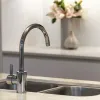Everyone makes mistakes, your humble bloggist included.
Some mistakes are no big deal. If you leave your car keys on the nightstand, you'll know it as soon as you try to crank the car. Like we said, it's no big deal.
But some mistakes are a bigger deal. They're expensive.
Plumbing mistakes can be like that. They can be expensive and inconvenient.
As we and many other plumbers around the country can attest, a large percentage of service calls result from preventable plumbing problems. In other words, if the homeowner had made a different decision, they wouldn't need us at all.
Or if they did still need us, it would be for a much smaller, simpler problem than the one we're ultimately called in to solve.
Let's take a look at some of the most significant plumbing mistakes we plumbers encounter out in the wild.
1. Underestimating the severity of a plumbing problem
This is when you notice something is wrong, but it doesn't seem too serious. So you kick the proverbial can down the proverbial road.
Case in point: slow-draining sinks.
Maybe you've noticed that your sinks don't drain as fast as they used to. It's a little weird, and you don't know why they're behaving that way. But it also isn't affecting your life in a serious way, so you ignore it.
The thing is, those slow-draining sinks could be a symptom of something that eventually does impact your life in a serious way.
When multiple sinks are clogged or draining slowly, there's a good chance you have a blockage in your sewer line. At first, it might not seem very significant because the water still drains. But one day, you could wake up to find that the water isn't draining. Or, worse yet, that you have sewage backup in a lower-level drain.
By calling a plumber about the slow-draining sinks, you might have avoided a lot of inconvenience. Not to mention the sanitation and hygiene disaster of having sewage appear inside your home.
Since slow-draining sinks are a common symptom of sewer line issues, the plumber could have performed a sewer camera inspection. After identifying the blockage, you can address it before it turns into a bigger problem.
2. DIY fixes
Fixing stuff yourself is admirable and can often save money.
But it can also go really badly. We know because we've seen it.
While the list of potential DIY plumbing mishaps is so long as to be outside the scope of this article, here are a few project types where it's usually better to call in a plumber:
- Clogs that won't budge
- Sewer line issues
- Any parts removal (piping and such)
- Anything involving valves or fittings
It's technically a code violation to remove any parts unless you're a licensed plumber, so keep that in mind as well.
In a nutshell, it's totally fine for homeowners to plunge toilets and replace faucet washers. But if you're dealing with valves or suspect a sewer line blockage, it's best to call in a plumber.
3. Flushing wet wipes or baby wipes
We know it says "flushable" on the packaging. Don't believe it.
These wipes, which are essentially baby wipes for grownups, have become increasingly popular in recent years. And they've been a real boon to the plumbing industry!
Unfortunately, these do not disintegrate like toilet paper. They can snag inside your pipes-especially if you've got older cast iron or concrete pipes-and cause a blockage in the sewer line.
The solution is to throw them in the trash instead. If that grosses you out, just use toilet paper.
Honorable mention for other things you shouldn't put down drains goes to:
- Cooking grease
- Feminine hygiene products
- Large food remnants
Fry oil will harden inside your pipes and cause a blockage. Pour it into a container and put it in the trash instead. Large food remnants should also be thrown away or composted. Potato skins and thick fruit peels are in this category.
Feminine hygiene products can block a drain the same way those wet wipes do. The solution is to throw them in the garbage.
4. Fear of spending money
Sometimes, you've just got to spend money on plumbing. Even if you don't want to.
But it can be hard to make the decision. Here's an example.
Say you notice unusually lush patches of grass in your yard. You know this is one of the outdoor signs of a sewer line problem, but you're not having any issues indoors. No slow-draining sinks. No clogs. Nada.
You know you've probably got a leaky sewer pipe, but you'd rather not deal with it. Or spend money on it. So you wait.
And the leak gets worse.
Pretty soon, you've got pooled sewage in your yard. The neighborhood kids might tromp through it. Or it might run into a nearby creek when it rains.
Not only have you got a health hazard on your hands. But now the leak is bigger, meaning your sewer pipe has an even larger crack in it.
The crack might be too large to repair. So instead of a minimally invasive trenchless sewer line repair, you'll have to hire a plumber to excavate and replace the damaged pipe.
The fear of spending money on the problem led to… the need to spend even more money on the problem.
5. Not performing preventative maintenance
Wouldn't it be nice if plumbing systems were just a "set it and forget it" sort of thing?
Sadly, they aren't. You've got to do some basic maintenance.
An effective annual plumbing maintenance checklist includes the following tasks:
- Health and safety inspections of equipment
- Water heater maintenance
- Water pressure analysis
- Water quality tests
- Toilet leak inspections
- Shutoff valve inspections
These just so happen to be the services we perform during our once yearly plumbing maintenance visit. By checking these items, we help you avoid plumbing disasters (damaging supply line leaks, for instance) and maximize the longevity of your water heater, fixtures, and toilets.
6. Lack of trust
You might have had a bad experience with a contractor. We all have.
But being overly suspicious of all plumbing or home services contractors could leave you in a bad spot. The fear of spending money with a plumber (see #4 above) or avoidance of preventative maintenance (see #5 above) might cost you a lot more in the long run.
Instead, it's a good idea to build a relationship with a plumbing company you trust. Look for a company that:
- Provides transparent pricing
- Offers visual evidence of problems they encounter (photos, etc.)
- Spends time listening to what you're concerned about and doesn't just talk about the services they think they can or should perform
- Sends friendly, punctual, knowledgeable technicians to your home
- Meets all basic requirements for ethical business practices, such as being licensed, bonded, insured, etc.
When you've got a plumber you trust, you don't have to worry. Any time there's a problem, you can call them and feel confident you're getting the best possible solution at a fair price.
Conclusion: It's wise to be aware of potential plumbing issues
That's what it really comes down to: Being aware of what the potential problems are, engaging in preventative maintenance, and just generally taking good care of your plumbing system.
And any time something does go wrong, you know your plumber has your back.
If you live in Metro Atlanta and are looking for a plumber you can trust, contact PV Heating, Cooling & Plumbing! Our team is ready to address any plumbing challenge and provides fair and transparent pricing.
Call us today at (404) 798-9672 or schedule service online!





